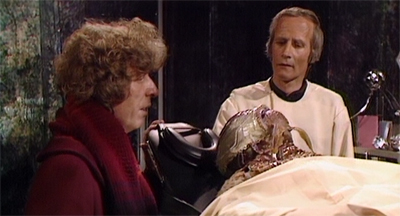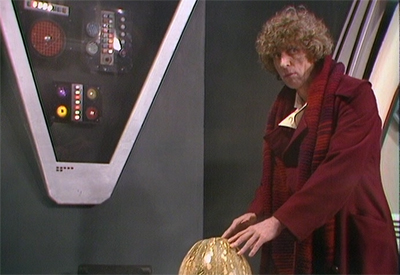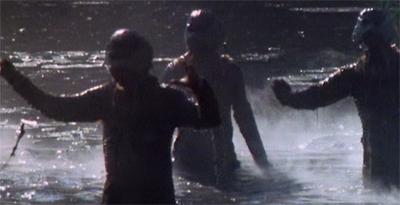To celebrate the fiftieth anniversary of the longest-running science-fiction show in the world, I’ll be taking weekly looks at some of my own personal favourite stories and arcs, from the old and new series, with a view to encapsulating the sublime, the clever and the fiendishly odd of the BBC’s Doctor Who.
Full Circle originally aired in 1980. It was the first instalment of the E-Space Trilogy.
Why can’t people be nice to one another, just for a change?
– the Doctor is still an optimist at heart
I have to admit, I’m kinda a bit frustrated with these “arcs” that Doctor Who was so fond of in the late seventies and into the eighties, with themes like The Key to Time, or The Black Guardian Trilogy or even Trial of a Timelord serving as an excuse to tie a bunch of distinct stories together with a few shared elements, mostly confined to intrusive opening and closing scenes rather than anything especially substantive. In particular, The E-Space Trilogy feels especially odd, because it’s located inside a larger arc exploring the final year of Tom Baker’s tenure, with entropy and decay evident everywhere. Being entirely honest though, it does help that Full Circleis a solid and clever little story, which genuinely feels like something quite different than the typical Doctor Who adventure.
Andrew Smith was nineteen years old when his serial was adapted to serve as part of the show’s eighteenth year, the first fan to have his work accepted without any prior experience. It’s quite an accomplishment, and one that is all the more impressive because the story is clearly constructed with a rather wonderful understanding of the show and its core philosophy, which is much more important than stunt casting or returning monsters or any nonsense like that.
I’m not even referring to Smith’s use of continuity, which is something of a sticking point to the show in its eighties. In fairness, it was a bit much to expect fans without VCRs to appreciate the countless references that tied together Attack of the Cybermen or for younger fans to recognise the aliens in Warriors of the Deep. I think that continuity did strangle the show a bit, but it isn’t what Smith does here. He references Leela in passing, who departed the TARDIS about two years earlier, and was a major part of the show. The Doctor also alludes to The War Games, but in an ambiguous sort of way. All you need to know – and what you get from the scene – is that even the Doctor must answer to the Time Lords. If The War Games never existed, it would be a tantalising character hint, and it’s stated clearly so the intent can’t missed. Smith’s references are light, and don’t exclude casual viewers from the story.
So, if it isn’t the continuity, what is it about the show that Smith gets so well? I think it’s the Doctor himself, as the ultimate (if alien) humanist. The Doctor as a force for good who comes crashing out of the sky, shakes up your little world, and departs. Smith knows that you need a “monster” for a classic Doctor Who adventure, so he gives us the Marshmen. However, Smith also knows that the Doctor’s true enemy isn’t some ugly-looking monster, it’s the oppressive system and its crushing weight. Baker gets some genuinely impressive moments here as he confronts a society built around “the supremacy of the community” and “the willful procrastination of endless procedure”, two concepts that infuriate him.
Hell, the Doctor can even see the humanity in the lost marsh creature, and is disgusted by the cold approach of the community towards it. As much as he hates procrastination, he doesn’t believe in progress through the suffering of others, and he is clearly repulsed by Dexeter, who defines his character with observations like, “The creature is no use at all under anaesthetic.” This is before “a surgical examination of its brain.” The Doctor’s impassioned attack on the Deciders is one of the character’s best moments, up there with his fury at the Eternals in Enlightenment. “You three are supposed to be leaders.”
Full Circle has a genuinely wonderful high-concept science-fiction feel to it, and I always appreciate it when the show attempts something like that, in contrast to men in silly rubber suits flailing around and guest stars chewing on the scenery – not that those can’t be fun as well. Full Circle feels more cerebral than a lot of the series, and this lends the adventure a rather strange feeling. It’s certainly more slowly paced than usual, but that’s not a bad thing. In a show that’s eighteen years old (and now fifty), it’s great to know that not every episode follows a formula, and some are simply built around very clever ideas.
Of course, there’s a lot happening inside Full Circle without Andrew Smith’s clever little science-fiction adventure. “E-Space” itself is a plot device and – to be fair – a relatively unobtrusive way of linking three relatively unrelated stories. On the other hand, the story does offer the first hint that Romana will be departing the TARDIS soon. Even the most beloved companion, Sarah Jane Smith, left with relatively little fanfare (at Elisabeth Sladen’s insistence), and it wasn’t until the relaunched series that we’d get this much foreshadowing around the departure of a companion, who very clearly doesn’t want to go. “Doctor, I don’t want to spend the rest of my life on Gallifrey,” she insists. “After all this.”It reminds me a lot of Rose’s departure from the series.
While I’m not a huge fan of excessive soap opera, I do like it. Romana has been traveling with the Doctor for over two years, and there’s a wonderful feeling of equality to their relationship. Hell, with the little robotic dog, they’re almost like a childless yuppie couple free-wheeling through time-and-space while all their friends have settled down and started families. Romana feels like much more of an equal to the Doctor than any companion until Donna arrived, and even then Donna didn’t have the same sort of intellectual authority (instead having her own moral compass and willingness to assert herself, as compared to other companions who seemed to have blind faith). Of course, it’s hard to watch Baker and Ward together without thinking of their marriage and off-screen romance, which lends the partnership an even stronger romantic feeling.
Also, spreading Romana’s departure over three serials draws out the sense of loss that the Doctor will feel. Leaving the Doctor has (generally) been seen as a right of passage, of growing up, a sign that the companion and the Doctor basically move on with their lives and find their own way in the wider universe. It’s a form of abandonment, but one that feels natural – he’s old and they’re young and they have lives to live following lessons learned. Here it’s different. He and Romana couldhave spent eternity together. It helps that Baker and Ward work well together. Despite being stranded in some of the worst stories of Baker’s tenure, the pair had genuine chemistry.
The other notable aspect of Full Circle is the introduction of Adric, one of those rare moments where everything seems to conspire against creating a fascinating or compelling character. Matthew Waterhouse was a Doctor Who fan, but that’s hardly a qualification for the role. His delivery here is by no means the worst of his tenure in the role, but he grates – even in his introductory scene, as he whines “it will!” when the others mock his belief that the ship will ever leave the planet. He’s not convincing in the slightest in what’s an demanding role.
It’s hard to tell what problems with Adric lie with Waterhouse’s performance or the script itself. There is one really awful moment where he patronisingly comments on the device Romana just handed him, “Oh, it’s a homing device.” I was waiting for Lalla Ward to slap the smug out of him. On the other hand, perhaps the hand of John Nathan-Turner was at play here. There seems to be an attempt to make Adric a bit “edgy” as a young companion. He’s introduced stealing food, and comes across a bit arrogant. “Of course I’m better than you,” he remarks at one point. “I’m an Elite.”Who thought that was a good idea?
I’m reminded of the Colin Baker controversy, where the production team tried to give him a sort of an arrogant devil-may-care attitude, with the idea that the audience would warm to him – something that backfired when they simply stopped watching. I wonder if Adric here is a sort of proto-Sixth-Doctor, an unsympathetic character who was meant to grow on us – but didn’t. Of course, the real difference is that Colin Baker was a much better actor than Waterhouse, for all that was worth. Part of me wonders why Nathan-Turner didn’t get the hint.
Still, these are relatively minor complaints. The script is solid and the direction is (mostly) good. There is one slightly awkward moment, as the music amps up in an eighties sort of way as the Deciders declare, one at a time, “I am Nefred”, “I am Garif” and “I am Login.” I was waiting for the moment at the end where the three declared, “Together, we are… the Deciders!” It would have been camp-tastic. That’s all I’m saying.
Aside from that one brief scene, Peter Grimwade’s direction is solid. The Marshmen are clearly men in suits, but they are handled well – moving en masse and camouflaged by the atmospheric dry ice seemingly pouring out everywhere. Little touches, like the fluid oozing from their mouths, just add to the effect. Grimwade has a talent for this, and it’s easy to see why the production team eagerly accepted a script from him. If I hadn’t seen Time-Flight, I would have thought he could have been a great Doctor Who writer.
Full Circle gets The E-Space Trilogy off to a good start, continuing the strong promise that The Leisure Hive hinted at back at the start of the season, but which was slightly derailed by Meglos. It’s bold and ambitious science-fiction, and it’s clever, too. It’s not the most action-packed aventure, nor is it the most distinctively Who-vian of Tom Baker’s adventures, but it does prove that the show still had quite a bit of imagination left in it.
We must simply accept the inconsistencies.
– you can tell the script came from a Doctor Who fan
Filed under: Television | Tagged: Adric, Andrew Smith, bbc, doctor, DoctorWho, E-Space, Full Circle, Lalla Ward, Peter Grimwade, Romana, Sarah Jane Smith, Smith, tardis, The E-Space Trilogy, Tom Baker |



























Leave a comment